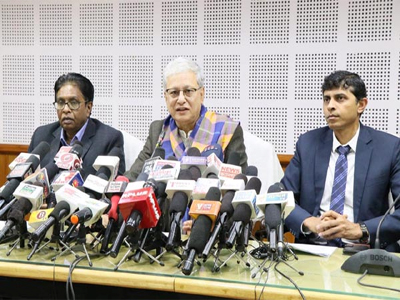Indian Nationalism- A Dharmic world view.
Jishnu Dev Varma

Going through a book on nationalism, in which the author has tried to flaunt his scholarship on by referring and quoting many western thinkers and writers on this subject. He has put forward an argument that patriotism and nationalism are two different aspects. His erudition cannot be denied but it is confusing. Are we to see most things only through the prism of western scholarship in order to redefine ourselves.
On the subject of nationalism he talks about civic nationalism where loyalty to the constitution is supreme, there is no debate on this matter but one should realise that the founding fathers of our constitution based the basic features of our great constitution on the cultural values that we have imbibed through our human experience and the collective wisdom of our civilisation. The Supreme Court in Keshavananda Bharati case and subsequently many others, asserted the basic structure doctrine, wherein it was held that basic structure cannot be amended as these were the values on which our nation stood. In other words the fundamental rights is the foundation of our nationhood. The right to life and right to equality have been expanded through numerous judgments of our Apex Court, indicating the organic or may we say the “ living value system “ of our thought process that is grounded in our culture . The Rik Veda proclaims,“ Ekam Sat bipraha bahuda badanti “ - The truth is one but the wise interpret in different ways”. Therefore to merely view our constitution as an adaptation of other constitutions from around the world would be unwise. The inclusiveness of taking the best suited for us is also an intrinsic part of our thought process.
It would therefore be biased to condemn that cultural nationalism or in one word Hindutva is an effort to homogenise by pounding the diversity of our nation into a homogeneous mass. Far from homogenisation, the concept of equality is an intergral part of our civilisation. The proclamation “ all men are created equal" which is a part of the sentence penned in 1776 by Jefferson during the beginning of the American Revolution that reads, "We hold these truths to be self-evident, that all men are created equal, that they are endowed by their Creator with certain unalienable Rights, that among these are life, liberty and the pursuit of happiness .“ Many ages before that the vedas proclaimed
“ Sarve bhabantu sukhi Nah,
Sarve bhabantu niramah,
Sarve bhadrani pashyantu.......,”
“Let each one pursue happiness ,
Let each one be free of disease,
Let each mind be uplifted,
Let none suffer”.
It also declared,“ All creatures are created with a purpose therefore have equal rights on this planet “. With every god or goddess there is an animal or “vahan” , which serves as their vehicle and there is also a plant associated with every deity. This was an effort to unite or to integrate in order to achieve a composite understanding of the cosmos.
The misinterpretation of what has been termed “Hindutva Nationalism “ based on the Dharmic world view is grossly misplaced. There is no scope here for feeling of superiority as every thought has an opposite one that is also revered. There is also no question of tolerance ,which implies the feeling of superiority. Tolerance is a much touted word that indicates “ we are superior that is why we need to put up with others, who are different from us” . Here we have, “ Sarva Dharma Samabhav”, “ All ways of Life are to be respected” which has been ineptly translated into English as secularism meaning “religion neutral” and in Hindi “ dharma nirapeksha”. There is also no need for conversion or for a belief that only our path will lead to salvation. Here we believe every living being is free to seek their salvation.
Democracy as it is understood today, is a system where the rights of the individual is safeguarded with utmost importance - so what could be more democratic than this. It is interesting to note that democracy was not discovered from elsewhere, the Buddhist Sanghas ( organisation) had democratic procedures in place, even prior to that Vedic Samities were also run on democratic principles.
Our Nationalism looks forward to carry this message to the world and India seeks to become the Viswa guru in propagation of this value system that is embedded deep into its culture. This effort goes by the term cultural nationalism or Hindutva as it is called today.
◦ Nationalism of this scope cannot be interpreted through a westernised lens where nations are viewed essentially as limited geopolitical entities. Here the nationalism is of humanity and how to integrate it with all its diversity into a global society . A lofty thought indeed but this is what it is. To break Hindutva down to some sort of theological state when there is none, is an effort to mislead.
◦ It is ridiculous to try and differentiate between Hinduism and Hindutva . The Hindu way of life is not an “ism” like other “isms” that are doctrines propagated through concept of superiority clothed as tolerance. The Dharmic way of life stresses on equality. Even the caste system was originally based on function and was not birth centric. There were numerous examples of crossovers from one caste to the other. However it later became to be defined by birth and ended up as a system of suppression till it was abolished.
◦ Here we think of integration of thought processes and ways of life, accommodation of opposing views. All in order to form a vibrant and colourful mosaic that the world in reality is and not a black and white picture of we versus them. It is a movement to stay deeply rooted, so that we may stand tall in the parliament of nations.
( The views expressed here are entirely personal)